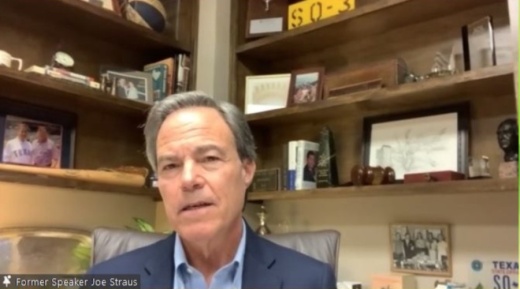Former state Sen. Florence Shapiro moderated the Jan. 5 discussion with former Rep. Joe Straus, who served as speaker of the Texas House of Representatives from 2009-19. Shapiro began her remarks by commenting on the “exceptional” circumstances surrounding the biennial gathering of legislators.
“We’ve had a lot of struggles over the last 20 years or so, but this one will be unique,” she said. “Recognizing that uniqueness will be of great value for all of us as we go through this.”
The only two duties legislators are constitutionally obliged to complete are the passage of the biennial budget and congressional redistricting. However, Straus said, there is no greater task before lawmakers this year than attempting to legislate the state’s COVID-19 response.
“We’ve got to get this vaccine distributed more effectively and in people’s arms as quickly as possible,” he said. “Whatever the Legislature can do to encourage that, we need to do.”
The second-most important issue before legislators is to advance historic gains made during the last session in the realm of public education, Straus said. Cutting funding for public schools should be avoided at all costs moving forward, he added.
“I’m hoping the legislature will protect that excellent work,” he said.
There is currently about $7.5 billion stored in Texas Economic Stabilization Fund, also known as the rainy day fund. The money is reserved for periods of intense economic strain, such as what has been experienced as a result of the pandemic. Straus said use of the fund will depend on the economic forecast from the state’s comptroller.
“I do respect and understand the need to have a healthy fund balance—it’s important to our fiscal standing among states and to rating agencies. ... I also think there are times when it’s appropriate to use it,” he said.
Shapiro and Straus also discussed the ongoing debate over whether taxpayer-supported lobbyists should be allowed in the Texas Capitol. Both legislators agreed that this would stifle local governments’ and local communities’ abilities to advocate for their needs.
The proposed ban is “an admission that lobbyists are stronger than legislators,” Straus said.
“Lobbyists can play a very important role in our system. ... Good lobbyists help a legislator come to good decisions,” he said. “It’s up to legislators to use good sense or good judgement when they pass or don’t pass legislation.”
The prospect of redistricting is expected to be even more difficult due to the delay in new census data caused by the pandemic. Population increases could cause the state to gain three new congressional districts, Straus said, but that data will not be available until February or March.
“Redistricting is never easy,” he said. “It is the most contentious, most partisan, most personal process that the Legislature goes through.”
There have been few silver linings to come out of this crisis, but Straus said it has taught state lawmakers to “expect the unexpected.” He said he hopes the challenging environment does not discourage groups or individuals from communicating with their legislators.
“Members of the Legislature want to hear from you—they want to do the right thing,” he said.
The session is slated to begin Jan. 12 and end May 31.





